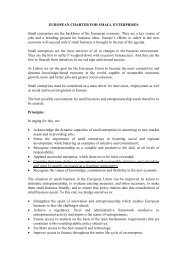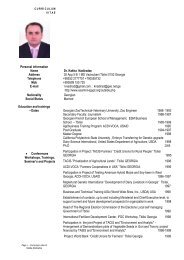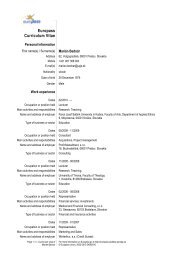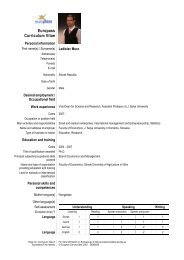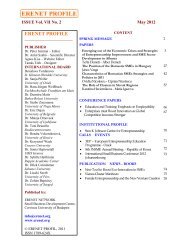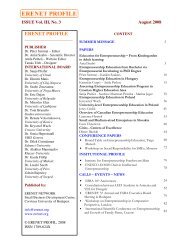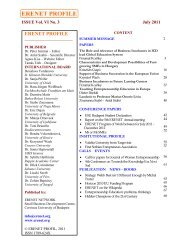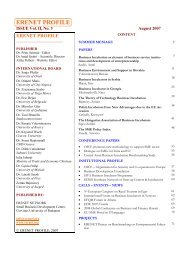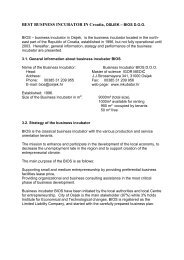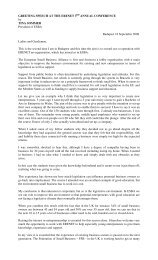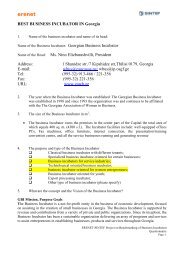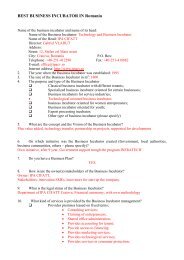• To support participation in economic missions;• To support access to third markets (setting up representative <strong>of</strong>fices <strong>and</strong>branches);• To support <strong>the</strong> preparation <strong>of</strong> internationalization studies, <strong>of</strong> plans for long-termexport etc.The most recently, NA<strong>SME</strong>C has launched The national multiannual programme(2005-2008) to develop <strong>the</strong> entrepreneurial culture among manager women from <strong>the</strong><strong>SME</strong>s sector. The main objective <strong>of</strong> this programme is to promote a system that facilitateswomen mobility on labour market <strong>and</strong> help <strong>the</strong>m to get involved in private economic structures<strong>and</strong> also maintain <strong>the</strong> balance between family <strong>and</strong> work. Its tasks are:• To stimulate self employment,• To develop <strong>the</strong> entrepreneurial spirit among women,• To raise <strong>the</strong> level <strong>of</strong> information about women entrepreneurship,• To raise <strong>the</strong> number <strong>of</strong> women entrepreneurs within <strong>the</strong> business community,• To create new start ups,• Equal access to <strong>the</strong> knowledge based economy.3.3.3.1. Business support services for <strong>SME</strong>sBusiness support organizations have <strong>the</strong> objective <strong>of</strong> assisting companies to set up <strong>and</strong>prosper through a wide range <strong>of</strong> services that might be provided at subsidized rate, or atmarket rate. For ease <strong>of</strong> exposition, Romanian business support services are grouped into threebroad categories, according to <strong>the</strong> type <strong>of</strong> services provided to <strong>SME</strong>s. In particular, <strong>the</strong>secategories are: reception, facilities <strong>and</strong> basic information; advisory services <strong>and</strong> training; <strong>and</strong>premises <strong>and</strong> environment.Reception, facilities <strong>and</strong> basic informationNA<strong>SME</strong>C is <strong>the</strong> main governmental provider <strong>of</strong> information regarding <strong>the</strong> <strong>SME</strong> sector, interms <strong>of</strong> sector statistics, publications, <strong>and</strong> databases. Beside this public informative service,NA<strong>SME</strong>C also disseminates, through its web site (www.animmc.ro) or through specificpublications, important information on sources <strong>of</strong> financing <strong>and</strong> donors’ support for <strong>SME</strong>s, howto set up an <strong>SME</strong>, laws affecting <strong>SME</strong>s, impact <strong>of</strong> EU accession, quality st<strong>and</strong>ards <strong>and</strong> ISOcertificates, <strong>and</strong> on initiatives related to <strong>SME</strong>s development at national <strong>and</strong> international level.As far as aspects related to EU accession are concerned, <strong>the</strong> European Commission hassupported, in 1995. <strong>the</strong> establishment <strong>of</strong> Euro Info Centers in Romania. The Romanian EuroInfo Center Network is made up <strong>of</strong> eight structures located in every economic developmentregion. Euro Info Centers are specialized in information, assistance, consultancy <strong>and</strong>documentation on European matters for helping Romanian enterprises, especially <strong>SME</strong>, incompeting successfully in <strong>the</strong> enlarged market. They provide information on various issuessuch as business opportunities, source <strong>of</strong> finance for <strong>SME</strong>s, EU legal acts for business,regulations <strong>and</strong> st<strong>and</strong>ards. Euro Info Centers also make available information <strong>and</strong> advise <strong>SME</strong>sin <strong>the</strong> process <strong>of</strong> performing <strong>the</strong> documentation for <strong>the</strong> Quality Management Systemcertification.In 2003-2004. Euro Info Centers were conducting an awareness campaign, seminars<strong>and</strong> workshops targeted to <strong>SME</strong> on crucial topics related to enlargement <strong>of</strong> EU, access toEuropean funds, taxation issue, <strong>and</strong> funding programme for <strong>the</strong> companies interested inimplementing <strong>the</strong> quality system within <strong>the</strong>ir business. As a result <strong>of</strong> this campaign, thirteenlarge public events were organized by several EICs to provide information on <strong>the</strong> economicimpact <strong>of</strong> Enlargement <strong>and</strong> on <strong>the</strong> need to prepare for <strong>the</strong> future competition <strong>the</strong>y will face inan enlarged European market. In order to promote innovation, <strong>the</strong> National Patent Office haslaunched <strong>the</strong> programme InovIMM® that is directed to ease access to a database <strong>of</strong> patents46
<strong>and</strong> new technologies. Information provided consists <strong>of</strong> a comprehensive literature on patents,specialised studies on innovation trends <strong>and</strong> latest developments, <strong>and</strong> innovative solutions forenterprises. The service is provided from <strong>the</strong> national contact point in Bucharest againstpayment.Advisory services <strong>and</strong> trainingAt national level <strong>the</strong>re are few providers <strong>of</strong> advisory services that can ensure awidespread presence in <strong>the</strong> country. NA<strong>SME</strong>C planned to set up local <strong>of</strong>fices to provide an easyto access help desks/contact points for <strong>SME</strong>. These <strong>of</strong>fices are meant to provide basic advisoryservices, <strong>and</strong> to assist entrepreneurs with applying for national grant schemes.Ano<strong>the</strong>r governmental body very active in this field is <strong>the</strong> National Agency for Labourforce <strong>and</strong> Employment (ANOFM), which is managing a special programme, “Businessconsultancy”, for providing consulting services to unemployed persons or youngsters thatintend to start <strong>the</strong>ir own business. The program is delivered through ANOFM local branches,where special consulting units have been set up.Because <strong>of</strong> <strong>the</strong>ir widespread presence in <strong>the</strong> country, Chambers <strong>of</strong> Commerce mightalso play effectively <strong>the</strong> role <strong>of</strong> business support organizations for <strong>SME</strong>. In Romania, <strong>the</strong>re are42 Chambers <strong>of</strong> Commerce, established as non-governmental <strong>and</strong> non–pr<strong>of</strong>it organizationswith free membership. Entrepreneurs’ associations are also involved in delivering supportservices for <strong>the</strong>ir members.Besides <strong>the</strong>se nationwide structures, <strong>the</strong>re are also some local business support centers,<strong>of</strong>fering a range <strong>of</strong> business development services to a local clientele <strong>of</strong> businesses. Many wereestablished as not-for-pr<strong>of</strong>it organizations upon donors’ support, <strong>the</strong>y targeted <strong>SME</strong>, but <strong>the</strong>irsustainability was doubtful. Fur<strong>the</strong>rmore, <strong>the</strong>y were much inclined to supply very generalbusiness services with a low degree <strong>of</strong> specialization, failing thus to address more sophisticatedneeds. On <strong>the</strong> contrary, <strong>the</strong> market <strong>of</strong> private business consulting companies is quite dynamic<strong>and</strong> has recently developed. It is now to this market segment that governmental <strong>and</strong> PHAREprograms have turned <strong>the</strong>ir attention, in order to help <strong>the</strong>se companies to deliver qualityservices for <strong>SME</strong>s in view <strong>of</strong> EU accession.On <strong>the</strong> o<strong>the</strong>r h<strong>and</strong>, dem<strong>and</strong> for business advisory services is still weak among Romanian<strong>SME</strong>s, as <strong>the</strong> results <strong>of</strong> <strong>the</strong> survey conducted by NA<strong>SME</strong>C in 2005 reveal. The chart belowclearly says that <strong>the</strong> proportion <strong>of</strong> <strong>SME</strong>s that never made use <strong>of</strong> advisory services in quiteimpressive (more than 60%).Company size seems to be positively correlated with <strong>the</strong> dem<strong>and</strong> for advisory services,since larger companies have sufficient financial means to procure <strong>the</strong>se services from <strong>the</strong>market. On <strong>the</strong> contrary, <strong>the</strong>re are not remarkable sector differences, although it might bededuced that <strong>the</strong> manufacturing sector is <strong>the</strong> most advanced in making use <strong>of</strong> businessconsulting services.The following chart describes sector differences in procuring consultancies by type <strong>of</strong>services used. Obviously, sectors display different patterns that are linked to very specificcompanies’ needs. However, it can be deduced that <strong>SME</strong> are mostly making use <strong>of</strong> trainingservices <strong>and</strong> <strong>of</strong> advice on functional area <strong>of</strong> business activity such as finance, marketing,production <strong>and</strong> design. The share <strong>of</strong> companies that were asking for assistance in <strong>the</strong> field <strong>of</strong>safety <strong>and</strong> quality st<strong>and</strong>ards <strong>and</strong> certificates is ra<strong>the</strong>r low, excepting <strong>the</strong> construction sectorwhere safety regulations are very restrictive.47
- Page 4 and 5: 1. SME DECLARATION AND WORKING GROU
- Page 6 and 7: While comparing the BSEC and EU doc
- Page 8 and 9: cooperation with the United Nations
- Page 10 and 11: GENERAL ASSESSMENT OF THE BSEC WG O
- Page 12 and 13: “Armenia's new law introduces a n
- Page 14 and 15: (iii)Share of the labor force of SM
- Page 16 and 17: The following data represents some
- Page 18 and 19: RankDocuments for export(number)Tra
- Page 20 and 21: • Industrial zones/Business incub
- Page 22 and 23: 3.1.4. FINANCING SMEsProf. Dr. Sela
- Page 24 and 25: • the loan is secured with movabl
- Page 26 and 27: 3.1.4.3. Mutual and loan guarantee
- Page 28 and 29: introduction of e-signatures, only
- Page 30 and 31: The Code of Conduct for Civil Serva
- Page 32 and 33: Trading Across Borders Enforcing Co
- Page 34 and 35: as with all non-governmental organi
- Page 36 and 37: Bulgarian SMEs obtain additional ca
- Page 38 and 39: • Project BG 2004/016-711.11.04 -
- Page 40 and 41: usiness is not approaching them oft
- Page 42 and 43: • Romanian citizens are recognize
- Page 44 and 45: The preparatory project of the NDP
- Page 48 and 49: In 2004, the National Institute of
- Page 50 and 51: Incubators host on average 11 SME,
- Page 52 and 53: Programs. The program is implemente
- Page 54 and 55: development instrument is extremely
- Page 56 and 57: accounting standards, including med
- Page 58 and 59: corporations and open held corporat
- Page 60 and 61: promoting SME sector, cooperation w
- Page 62 and 63: • for unemployed (micro credit)
- Page 64 and 65: are private pension funds, broker h
- Page 66 and 67: very early steps of its democratic
- Page 68 and 69: Another negative factor that is mor
- Page 70 and 71: economy. The so called in the organ
- Page 72 and 73: Federal funds, private capital, esp
- Page 74 and 75: 4.3. MOLDOVATable 14.Dimensions Neg
- Page 76 and 77: Related andsupportingindustriesDome
- Page 78 and 79: Technological:Internetaccessibility
- Page 80 and 81: Domesticdemand• Still not many pe
- Page 82 and 83: international investments• Govern
- Page 84 and 85: 3. Hamel, G., Prahalad, C.K. (1994)
- Page 86 and 87: 5.2 DEVELOPMENT OF THE SME SECTOR I
- Page 88 and 89: General Characteristic of SME Devel
- Page 90 and 91: Index of SME Development in Armenia
- Page 92 and 93: The same problem exists in getting
- Page 94 and 95: SME support infrastructure in Armen
- Page 96 and 97:
5 million was provided by UNDP and
- Page 98 and 99:
5.3 DEVELOPMENT OF THE SME SECTOR I
- Page 100 and 101:
Diagram 1. The number of small ente
- Page 102 and 103:
The privatization process of object
- Page 104 and 105:
13.Cabinet Provision on “Distribu
- Page 106 and 107:
5.3.3. SME support infrastructure i
- Page 108 and 109:
The role of the state in technical
- Page 110 and 111:
General situation of credit marketT
- Page 112 and 113:
After creation and starting impleme
- Page 114 and 115:
At the meantime, small enterprise s
- Page 116 and 117:
Table. 32.Ease of businessDoingBusi
- Page 118 and 119:
people who start small businesses t
- Page 120 and 121:
are salaried and the medium - sized
- Page 122 and 123:
Technology Foresight in Greece 2001
- Page 124 and 125:
Greek VC market started to develop
- Page 126 and 127:
In the area of bankruptcy and restr
- Page 128 and 129:
enterprises. According to TURKSTAT,
- Page 130 and 131:
small size enterprise or micro ente
- Page 132 and 133:
industrial enterprises. Undersecret
- Page 134 and 135:
individuals, rather than well struc
- Page 136 and 137:
7. SUGGESTIONS FOR THE SME DEVELOPM
- Page 138 and 139:
Annex 1.MAP OF THE BLACK SEA COUNTR
- Page 140 and 141:
17-18 June 2005 1 st Moscow Interna
- Page 142 and 143:
ARMENIASTRENGTHS• Application of
- Page 144 and 145:
BULGARIASTRENGHT• Flexibility and
- Page 146 and 147:
GREECESTRENGHT• They have a vital
- Page 148 and 149:
ROMANIASTRENGHTWEAKNESS• Stabilis
- Page 150 and 151:
REPUBLIC OF SERBIASTRENGHT• Longe
- Page 152 and 153:
UKRAINESTRENGTHS• Well educated l
- Page 154 and 155:
In compliance with the Resolution m
- Page 156 and 157:
1. Please provide definition of SME
- Page 158 and 159:
7. Did you establish a dedicated bo
- Page 160:
11. Do you have any suggestions for



